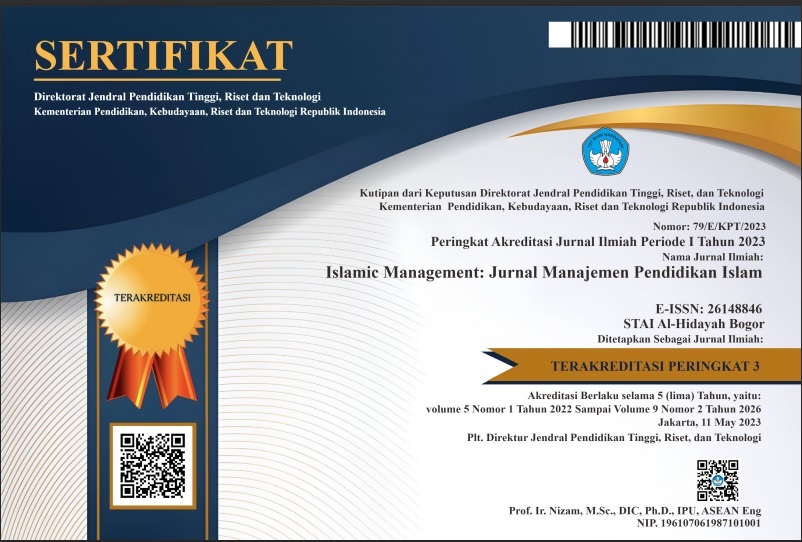IMPLEMENTASI MANAJEMEN PEMASARAN JASA PENDIDIKAN DALAM MENINGKATKAN KEPUASAN PELANGGAN DI MADRASAH ALIYAH TERPADU (MAT) DARUL FALLAH BOGOR
DOI:
https://doi.org/10.30868/im.v2i02.513Abstract
The management of marketing education services will be good if done correctly and professionally. The aim of the marketing management of education services is to facilitate the institution in marketing its educational services to the community. The purpose of this study is to be able to find out how the implementation of the mix strategy in the marketing management of education services in the Darul Fallah Integrated Aliyah Madrasah (MAT) Bogor. This scientific research uses qualitative methods by collecting data from field observation activities, interviews with relevant sources, and taking documentation from the research site. The marketing mix of education services in MAT Darul Fallah Bogor includes: (1) Product strategy; (2) Price Strategy; (3) Place Strategy (location); (4) Promotion Strategy; (5) People Strategy; (6) Physical Evendece Strategy; and (7) Process Strategy. In addition, this study also discusses the development of marketing education services in MAT Darul Fallah Bogor from year to year and various kinds of educational services products offered so that consumers are more interested in seeing firsthand the advantages of this school.
Keywords: management, marketing, education services, satisfaction.References
Kulsum, U., Sarifudin, dan Maya, R. (2019). Implementasi Manajemen Infrasruktur Pendidikan di SMP Islam HASMI Bogor. Proceeding. The 2nd Annual Conference on Islamic Education Management: THE SCIENTIFIC PARADIGM OF ISLAMIC EDUCATION MANAGEMENT. Manado: ACLEM, PPMPI, IAIN MANADO, dan PERMA PENDIS INDONESIA.
Maya, R. (2016). Revitalisasi Keteladanan dalam Pendidikan Islam: Upaya Menjawab Peluang dan Tantangan Pendidikan Islam di Era Masyarakat Ekonomi ASEAN (MEA). Edukasi Islami: Jurnal Pendidikan Islam, 05(09).
Maya, R. (2017). Karakter (Adab) Guru dan Murid Perspektif Ibn Jamâ'ah Al-Syâfi'î. Edukasi Islami: Jurnal Pendidikan Islam, 06(12).
Maya, R., dan Lesmana, I. (2018). Pemikiran Prof. Dr. Mujamil Qomar, S.Ag tentang Manajemen Pendidikan Islam. Islamic Management: Jurnal Manajemen Pendidikan Islam, 01(02)
Sarifudin. (2018). Manajemen Facebook dalam Proses Pembelajaran Pendidikan. Islamic Management: Jurnal Manajemen Pendidikan Islam, 01(01).
Sarifudin. (2019). Implementasi Supervisi Kepala Sekolah terhadap Kinerja Guru dalam upaya Meningkatkan Kualitas Pembelajaran. Islamic Management: Jurnal Manajemen Pendidikan Islam, 02(01).
Alma, B. (2005). Pemasaran Stratejik Jasa Pendidikan. Bandung: Alfabeta.
Alma, B. (2009). Manajemen Corporate dan Strategi Pemasaran Jasa Pendidikan Fokus pada Mutu dan Layanan Prima. Bandung: Alfabeta.
Alma, B. (2014). Manajemen Pemasaran dan Pemasaran Jasa. Bandung: Alfabeta.
Asmani, J.M. (2015). Manajemen Efektif Marketing Sekolah Pertama. Yogyakarta: Diva Press.
Haryati, Y. dan Muhsin, M. (2014). Manajemen Sumber Daya Pendidikan, Bandung: CV Pustaka Setia.
Hidayat, A dan Machali, I. (2012). Pengelolaan Pendidikan. Yogyakarta: Kaukaba.
Setiadi, J.N. (2003). Perilaku Konsumen: Konsep dan Implikasi untuk Strategi dan Penelitian Pemasaran, Jakarta: Prenada Media.
Mulyono. (2008). Manajemen Administrasi dan Organisasi Pendidikan, Yogyakarta: Ar-Ruzz Media.
Qomar, M. (2007). Manajemen Pendidikan Islam: Strategi Baru Pengelolaan Lembaga Pendidikan Islam, Jakarta: Erlangga.
Soemanagara. (2006). Strategic Marketing Communication: Konsep Strategi dan Terapan. Bandung: Alfabeta.
Sutisna. (2003). Perilaku Konsumen dan Komunikasi Pemasaran. Bandung: PT Remaja Rosdakarya.
Tim Dosen Administrasi Pendidikan UPI. (2011). Manajemen Pendidikan, Bandung: Alfabeta
Usman, H. (2006). Manajemen: Teori, Teknik, dan Riset Pendidikan. Jakarta: Bumi Aksara.
Wijaya, D. (2012). Pemasaran Jasa Pendidikan, Jakarta: Salemba Empat.
Wijaya, D. (2016). Pemasaran Jasa Pendidikan, Jakarta: PT Bumi Aksara.
Downloads
Published
How to Cite
Issue
Section
Citation Check
License
Authors who publish with this journal agree to the following terms:
- Authors retain copyright and grant the journal right of first publication with the work simultaneously licensed under a Creative Commons Attribution License that allows others to share the work with an acknowledgment of the work's authorship and initial publication in this journal.
- Authors are able to enter into separate, additional contractual arrangements for the non-exclusive distribution of the journal's published version of the work (e.g., post it to an institutional repository or publish it in a book), with an acknowledgment of its initial publication in this journal.
- Authors are permitted and encouraged to post their work online (e.g., in institutional repositories or on their website) prior to and during the submission process, as it can lead to productive exchanges, as well as earlier and greater citation of published work (See The Effect of Open Access).







